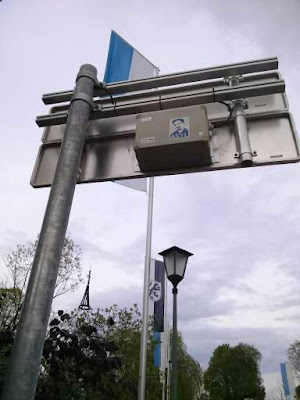Still, it would have been interesting to be there at the same time as the Summit. I'm curious about what the leaders of the world's biggest economies might accomplish, or not, at their latest gathering in Bavaria. And what the thousands demonstrating in the streets of nearby Garmisch-Partenkirchen might draw attention to, as well. Canadian readers may wish to note that the Germans weren't building any godawful gazebos in the Summit run-up period, as was done in Muskoka; apparently wasteful schlock is not a requirement of the host country.
Regardless of timing, my teenaged son got a political booster shot on his first trip to Europe. With our German friends we discussed the state of surveillance and the surveillance state; the Greek-EU financial crisis (an argument ensued--and for politicos, an argument is a welcome event, as happy as a wedding); Canada's genocidal treatment of First Nations people (also much in the news this week); and more. On our own, we visited historic sights in Munich, Nuremberg, and Dachau and considered them through the prism of current events. We even had a chance encounter in a cafe, where a stranger seated near us, an older man, opined at length, unprompted, about American foreign policy. He said that Germans are truly shocked by US actions (Iraq, the spying episodes, drones) and concerned about rising fascism. I was polite but noncommittal, which I thought best as a visiting foreigner, not knowing anything about this guy. His demeanor remained solemn and measured throughout. But after a bit, he backpedaled. One should be careful, he said, when speaking of such things. Too late, I wanted to say. A strange politically-charged moment.
So besides the many churches we entered--and my kid reached his saturation point on gilded rococo cathedrals early on--politics emerged as our traveling theme. In case you're feeling sorry for him just about now, know that we also viewed beautiful art and very cool technology exhibitions, took the high-speed train, drove on the Autobahn at 220 km/hour (or rather, were driven; I certainly couldn't drive that fast), ate rich food and even hiked in the Alps one afternoon, but I'm afraid the chatter among our multinational group of hikers was mostly about...you know.
I guess we'll see what happens at Schloss Elmau, but the Reuters photo of Barack Obama and Angela Merkel embracing as they begin bilateral talks in advance of the Summit could not be more entertaining, given two countries very much at odds at the moment. I can't help imagining Merkel whispering in his ear, "Tell me you've destroyed my mobile phone records, Barack" or sweetly challenging him to find the edible nano-recording device hidden in the lunch they will soon have. At the press conference he makes a lederhosen joke (check out the video link (scroll down)--the lederhosen-clad fellow standing behind him is not amused). At some point they repair to a welcome-to-Germany luncheon, which the BBC faithfully reports on, even using the subheading "Sausages", for Ludwig's sake. Breaking: the Chancellor and POTUS enjoyed sausages and beer in the Bavarian sunshine.
What a coincidence. We, too, enjoyed sausages and beer in the Bavarian sunshine. In addition to the weisswurst and rostbratwurst typical of the region, we were served a local dish called sausage salad, which I had never had before. It consisted of shredded sausage, a mayonnaise-based dressing and, I was told but could not discern in the mix, cucumbers. Nano-particle vegetables stealthily dropped into the salad.
Following are a few more highlights.
Transit: the S-bahn suburban transit system connecting Munich to outlying villages is genius. Cheap, easy, and reliable, with seamless connections to the city subway. The honor system prevails--no one checks tickets, although there were warning signs about fines for those caught without one. And, of course, every station has parking for hundreds of bikes. The bike lots are full.
 |
| Nuremberg subway station entrance--go into the tower |
 |
| On the train to Munich |

We stayed in a village called Wolfratshausen, which is 1000 years old. Munich, in contrast, is *only* 800 years old.
 |
| International memorial at Dachau |
In Nuremberg, we happened upon this monument, which is the Way of Human Rights. Inscribed on each pillar is an article of the UN Human Rights Declaration, in German and another language. The effect is quite moving, given Nuremberg's history as the site of the biggest Nazi rallies, and then mostly destroyed by bombing during World War II.
 |
| A key to the languages used for each article of the Human Rights Declaration. |
 | ||||
Our friend took us to this chapel, which overlooks lush rolling hills and in the distance, the Alps. It also has a war story, which has to do with downed British bomber pilots who were given proper burials contrary to Nazi orders, and the village was subsequently spared from devastation by Allied troops.
|
 |
| The site at Lake Starnberg where King Ludwig II, having been declared insane, deposed and imprisoned, either committed suicide by drowning or was murdered in 1886 |
 |
| Heiliggeistkirche (Holy Ghost Church) in Munich.I don't know the details about this cloud of paper doves hanging from the ceiling, but it's probably at least partly about peace, no? |





